Safety Information
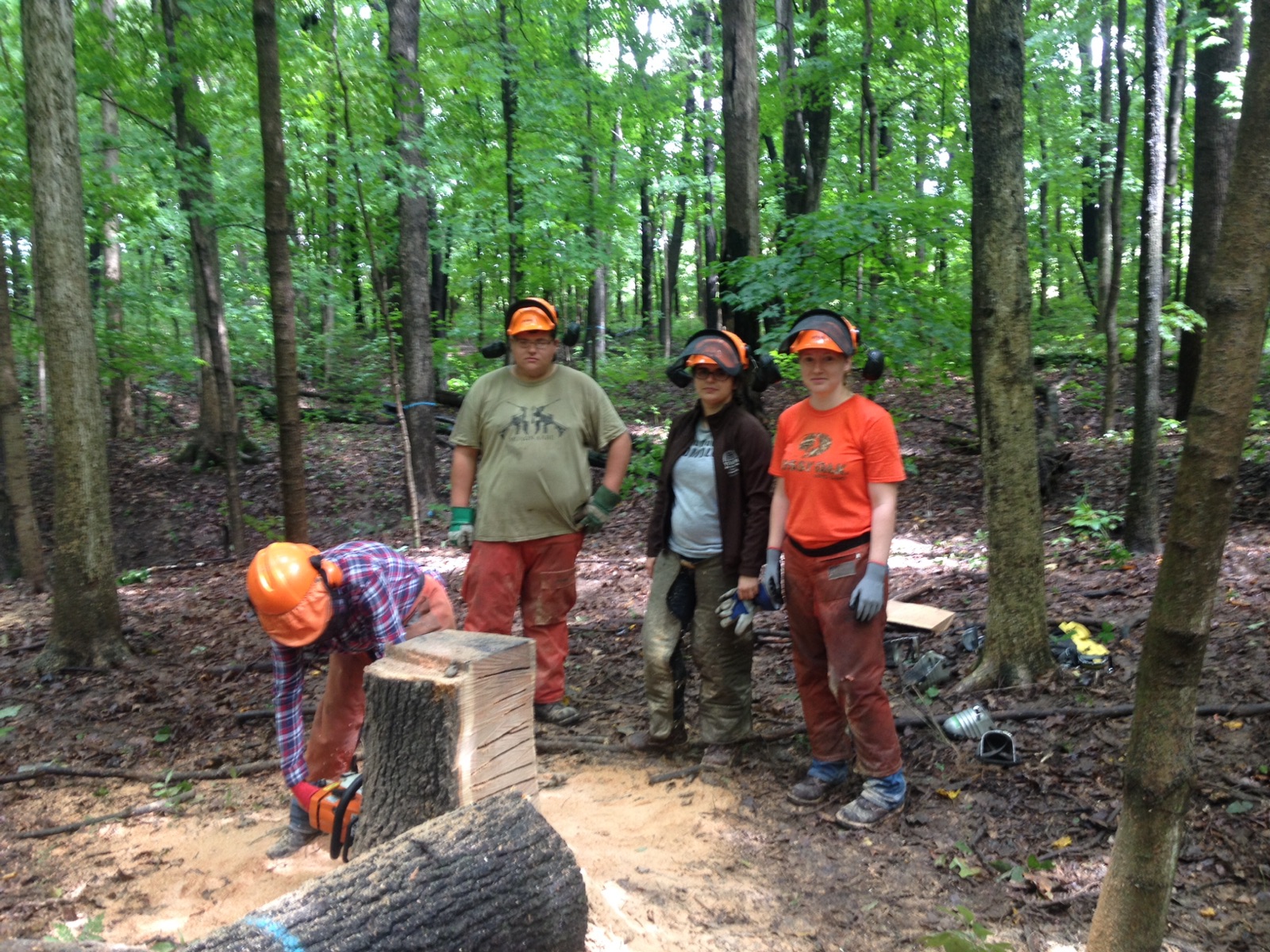 These safety resources are available to Purdue students and staff with some course open for registration first to FNR students and staff. Check out the individual training pages below to learn more about each class.
These safety resources are available to Purdue students and staff with some course open for registration first to FNR students and staff. Check out the individual training pages below to learn more about each class.
For more information on Basic First Aid, CPR/AED, and Chainsaw Training, please contact Dr. Mike Saunders at 765.430.1440, email msaunder@purdue.edu.
For more information on Pesticide, Tractors and Implements, Altec Aerial Lift, or Brush Saw Training, please contact Brian Beheler at 765.583.3507 or behelerb@purdue.edu.
FNR Field Research Safety Planning Form
FNR Field Safety Recommendations
Learn More
Basic First Aid Training provides introductory skills for addressing injuries while conducting lab and field work. These skills can be essential when working in locations where emergency personnel response cannot provide immediate assistance in the case of an accidental injury.

Topics covered include care for:
- Cuts, scrapes, and bruises
- Broken bones
- Stings and bites
- Head injuries and strokes
- Shock
- Environmental Injuries (e.g., frostbite)
- All faculty, staff, and teaching assistants working in "remote" sites as part of teaching duties
- Groups of individuals working in close proximity (i.e., within earshot) on a remote site (at least two per group)
On Campus Training:
- Division of Recreational Sports - Basic (standard) first aid classes are offered frequently during the year.
- Purdue Fire Department - Purdue University Fire Department offers American Heart Association courses in CPR/AED training.
- Department of Forestry and Natural Resources - Department of FNR schedules a first aid/CPR training course tailored to our profession administered by Purdue Fire. Watch for announcements.
- Franciscan Education Community Center - Classes occur approximately once per month.
- American Red Cross - Offers many class options, often in combination with CPR/AED. Multiple classes are available per month and some are online. Cost varies and training may occur in nearby communities.
CPR/AED Training teaches participants the proper responses to cardiac and breathing emergencies in children and adults. Participants practice cardiopulmonary resuscitation (CPR) and use of an automated external defibrillator (AED) on special medical dummies. This training is often done in conjunction with basic first aid training and is good for two years.
AEDs are now available for use in all public buildings on campus and in the Wright Center. The department also owns a portable AED for extended field use.
 All FNR staff, graduate and undergraduate students, and employees are highly encouraged to have CPR and AED training, especially those working at "remote" sites or working solely in laboratory settings. However, CPR and AED training (along with associated Basic First Aid training) is required by FNR policy for:
All FNR staff, graduate and undergraduate students, and employees are highly encouraged to have CPR and AED training, especially those working at "remote" sites or working solely in laboratory settings. However, CPR and AED training (along with associated Basic First Aid training) is required by FNR policy for:
- All faculty, staff, and teaching assistants working in "remote" sites as part of teaching duties
- Groups of individuals working in close proximity (i.e., within earshot) on a remote site (at least two per group)
- FNR Sponsored - Department of FNR schedules a first aid/CPR training course tailored to our profession administered by Purdue Fire. Watch for announcements.
- Division of Recreational Sports - CPR/AED classes are offered frequently during the year. Cost is $50-65 per person.
- Franciscan Community Education Lafayette - Classes occur approximately once per month. Cost is $50 per person.
- American Red Cross - Offers many class options, often in combination with Basic First Aid. Multiple classes are available per month and some are online. Cost varies and training may occur in nearby communities.
Take Note: there are currently three CPR / First Aid training events scheduled for the spring on March 26th, April 1st, and April 15th. The department will pay for training for all TAs and instructors of field-based lab courses, and the cost for others is $60. Sign up for a training session using the Doodle poll, and contact Brian Beheler if you have further questions.
Once you have completed CPR and AED training, please provide documentation of your training to Dr. Mike Saunders.
Chainsaws are dangerous pieces of equipment that can cause loss of limb or life with careless use. Several individuals in FNR, even those with years of experience, have had "close calls" with a chainsaw. While training does not eliminate the danger associated with chainsaw use, it dramatically reduces that danger by both demonstrating the proper felling and climbing techniques and identifying those situations where extra care must be used.
This training is typically divided into multiple sessions (i.e., levels) or a multi-day program depending on the certifying organization. Most certifications are not transferable among organizations. In all cases, initial levels provide background and minimal experience in tree felling techniques and basic operation and maintenance of a chainsaw. More advanced levels build upon tree felling techniques for difficult and/or leaning trees, bucking downed trees, handling "spring poles" and other more potentially challenging/dangerous situations.
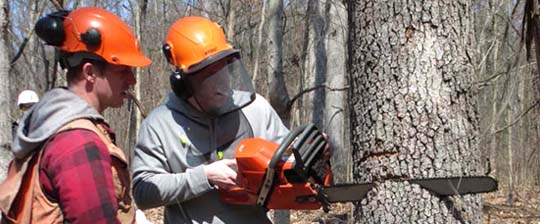 All FNR staff, graduate and undergraduate students, and employees who operate chainsaws in the course of research, teaching, or outreach activities, or as part of employment or student club activities, are encouraged to take at least a basic level of chainsaw training. Advanced training is also encouraged. On Campus Training:
All FNR staff, graduate and undergraduate students, and employees who operate chainsaws in the course of research, teaching, or outreach activities, or as part of employment or student club activities, are encouraged to take at least a basic level of chainsaw training. Advanced training is also encouraged. On Campus Training:
- Trees Fall for Me, Safely - This FNR-sponsored workshop is held annually, generally early in the fall semester on a Saturday. It is open to undergraduate and graduate students, staff and faculty, but spots are generally limited to 15-20 individuals. Introductory and advanced courses are offered, each lasting a day. There is no cost .Contact Don Carlson to see if a training program is available.
- Individual - Several FNR staff are qualified to conduct basic chainsaw safety and tree felling training through extension programming. Contact Don Carlson to see if a training program is available.
- The Indiana Division of Forestry frequently offers SAWW Training which offers chainsaw certification as part of its logger training program. They offer four levels of chainsaw safety training; each level is a 1-2 day workshop. SAWW certification is recognized by some state agencies and private companies in the U.S., but is not transferable for U.S. Forest Service chainsaw certification. State-organized workshops are held several times a year, but do cost. Most workshops are open to Purdue students and staff. To see if any training sessions are being held in Indiana contact the Indiana Department of Natural Resources, Division of Forestry.
- Stihl - Stihl provides training through several distributors around the county. Although the training is intended for companies and municipalities, they often will allow students to attend. The training is generally not free and may occur in an adjoining state.

- Handlers are all employees that mix, load, or apply agricultural pesticides; clean or repair pesticide application equipment; or assist with the application of pesticides in any way. Handlers must be trained before performing any handling task.
- Workers are all employees that perform tasks related to the cultivation and harvesting of plants on University farms or in greenhouses, nurseries, or forests. Workers include anyone employed for any compensation doing tasks, such as carrying nursery stock, repotting plants, or watering, related to the production of agricultural plants at the University.
- It is also required by law to receive pesticide training if applying pesticide for private (farms) or commercial (restricted-use for function of job or for hire).
Training certification expires every five years unless attending conferences that offer Continuing Certification Hours (CCH). Training is provided to Purdue employees at no charge. Otherwise, training is $60, the book is $30, and the Students Exam itself is free.
Where to Receive Training:
- Radiological and Environmental Management (REM) - WPS Pesticide Safety Training is available from REM.
- Office of Indiana State Chemist - The Office of Indiana State Chemist is located at Purdue University and provides trainings, exams, and CCH opportunities on their website.
Radiological and Environmental Management (REM) provides online training for the safe handling of lab chemicals. This includes, but is not limited to, the chemical classification system, laboratory safety controls, the personal protective equipment policy and hazardous waste management.
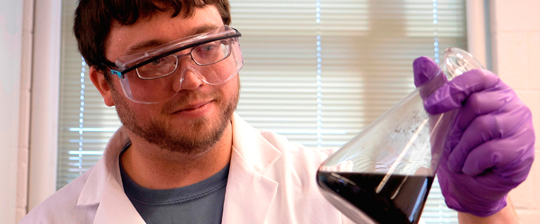 Purdue's Chemical Hygiene Plan training is required annually for every individual working in the lab, in any capacity (student and/or employee), and must be taken prior to working in the lab. This will help to ensure safety of individuals working with hazardous chemicals and/or procedures in a lab setting.
Purdue's Chemical Hygiene Plan training is required annually for every individual working in the lab, in any capacity (student and/or employee), and must be taken prior to working in the lab. This will help to ensure safety of individuals working with hazardous chemicals and/or procedures in a lab setting.
Online training is available at REM's Chemical Hygiene Plan page.
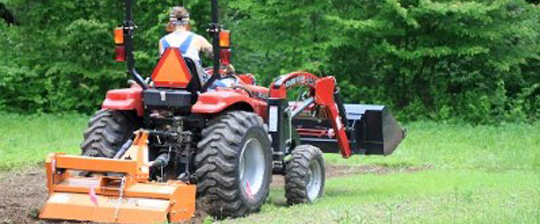 This training is an introduction on the safe operation of tractors, PTO driven implements, three-point hitches, rotary mowers, tillage, and other various implements. The focus of this training is on safety features and concerns as well as engines and other systems.
This training is an introduction on the safe operation of tractors, PTO driven implements, three-point hitches, rotary mowers, tillage, and other various implements. The focus of this training is on safety features and concerns as well as engines and other systems.
Faculty, staff, and graduate students who have reason to operate equipment for research are not allowed to operate the equipment without proof of experience and/or training. This training should be taken before operating equipment, or as a refresher if needed if there has been a couple years since last operating.
While there is no official certification, the staff of Martell Forest or Lugar Forestry Farm will provide training on a case by case scenario. For more information, please contact Brian Beheler at 765.494.5015 or .
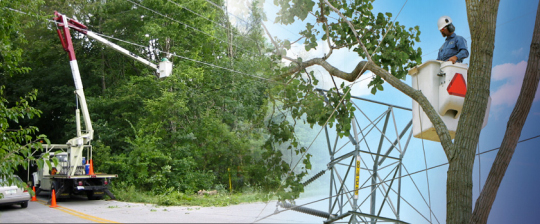 This training is on the safe operation, hazards, engine components, and aerial devise of an aerial lift.
This training is on the safe operation, hazards, engine components, and aerial devise of an aerial lift.
Faculty, staff, and graduate students who have reason to operate an aerial lift for research need to take this training, as it is an expensive and potentially dangerous piece of equipment to use. If operation is limited, a refresher course should be taken every year.
While there is no official certification, unless working around power lines, the staff of Martell Forest will provide training upon individual request. For more information, please contact Brian Beheler at 765.494.5015 or behelerb@purdue.edu.
Brush saws are becoming a popular choice of hand tool for invasive plant management as well as other applications in forest management. Learning how they operate, how to sharpen, and how to safely use them in the field will provide safer and more efficient operators.
Faculty, staff, and graduate students who would like to learn a tool used for invasive plant management, forest management, and wildlife management should take this operation and safety training course before operating a brush saw. Individuals who have not had extensive use of the equipment or long periods of time have passed since last training are encouraged to re-take some training.
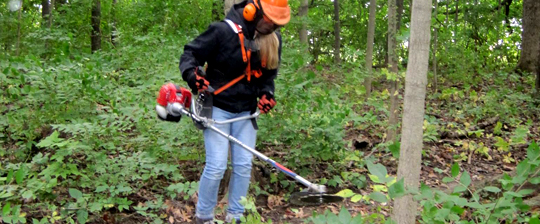 Where to Receive Training:
Where to Receive Training:
- Invasive Species Training Module - Training is led by faculty and staff with an evening class time followed by a day in the field. Part of the training includes the operation of brush saws and their maintenance. Dates are usually in the middle of October.
- FNR 339 Silviculture - As part of this class, students are given further training during a laboratory exercise on use of brush saws for understory clearing and invasive plant management. There may be room for 1-3 individuals to join the class for that day. Contact Mike Saunders to inquire on availability.
- FNR 341 Wildlife Habitat Management - As part of this class, students are given opportunity to use brush saws to cut invasive plants down during a laboratory exercise. Contact Liz Flaherty for more information.
- For those who are unable to find training opportunities and your research requires vegetation clearing with a brush saw, Brian Beheler can provide individual training opportunities.
View our nine research areas along with our world-class faculty.
Purdue centers seek to support and enhance the research and partnership enterprise at Purdue University. The centers are valued and encouraged at Purdue as they create a venue for faculty to come together to pursue common goals. Forestry and Natural Resources have faculty and staff involved in six centers here at the University.
The Department of Forestry and Natural Resources maintains an impressive collection of state-of-the-art research and education facilities. These labs, green houses, and educational facilities are a fundamental component that enables our faculty and students to learn, make new discoveries, and engage our clients in using these discoveries to sustain our nation’s ecosystems and natural resources.
The mission of the Department of Forestry and Natural Resources is to develop and disseminate knowledge in the natural resource sciences associated with the protection, management, and sustainable use of terrestrial and aquatic ecosystems. One way the department accomplishes our mission is by owning and managing 24 properties located throughout the state to provide opportunities for research, extension, and education that achieves sustainable use of our natural resources.
